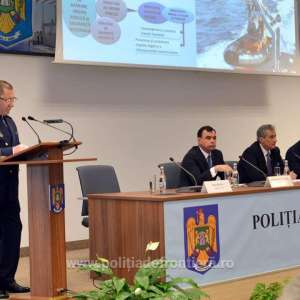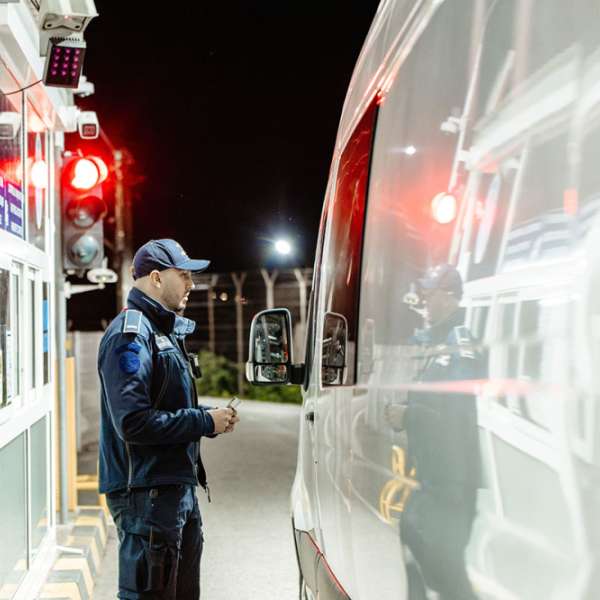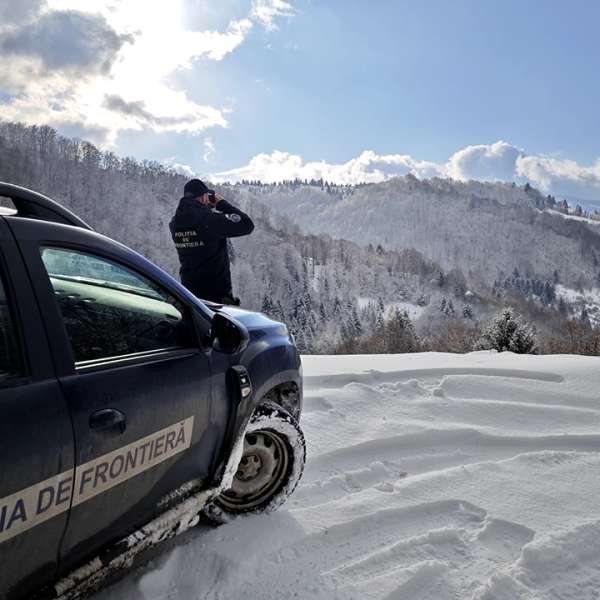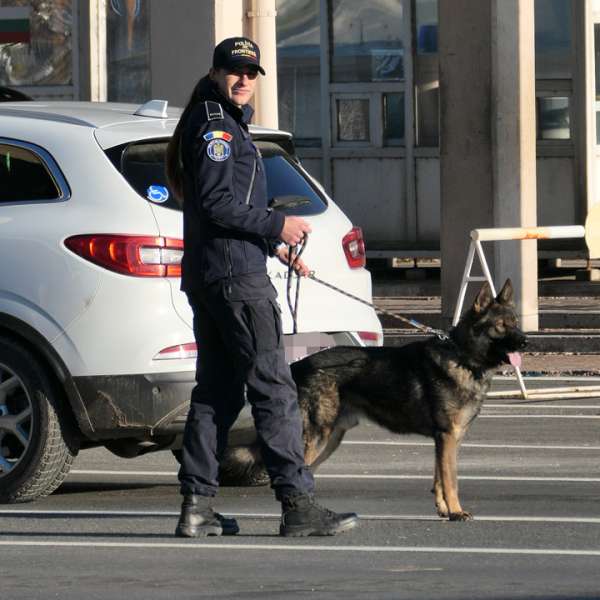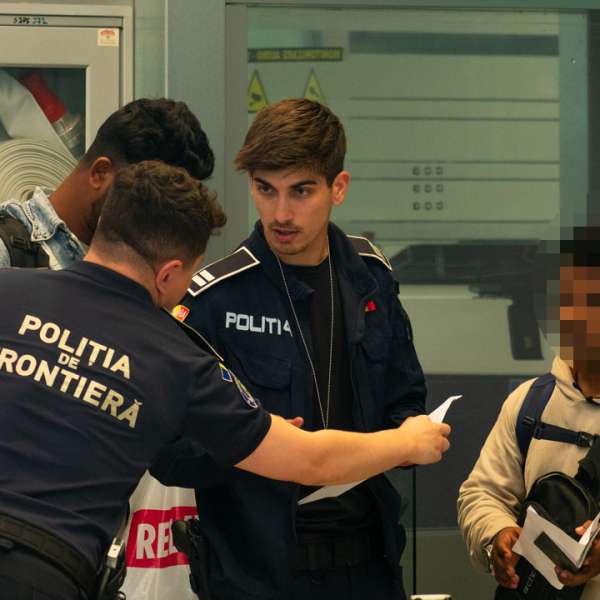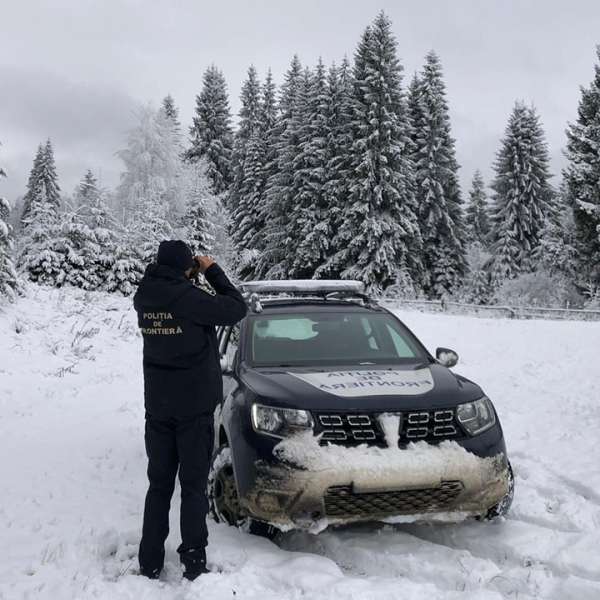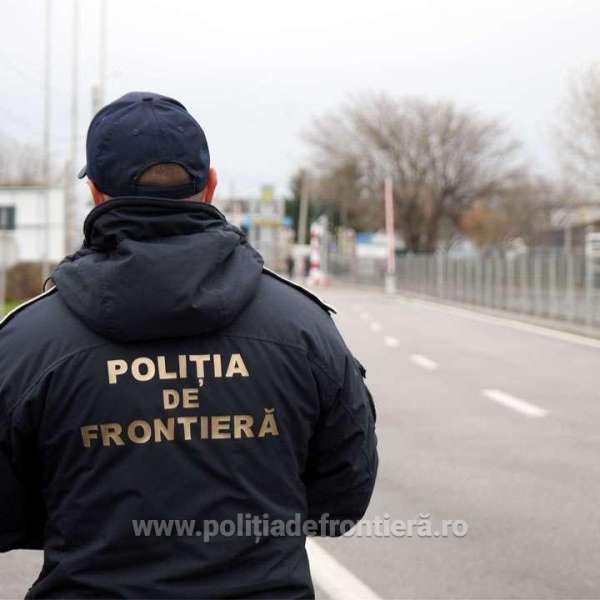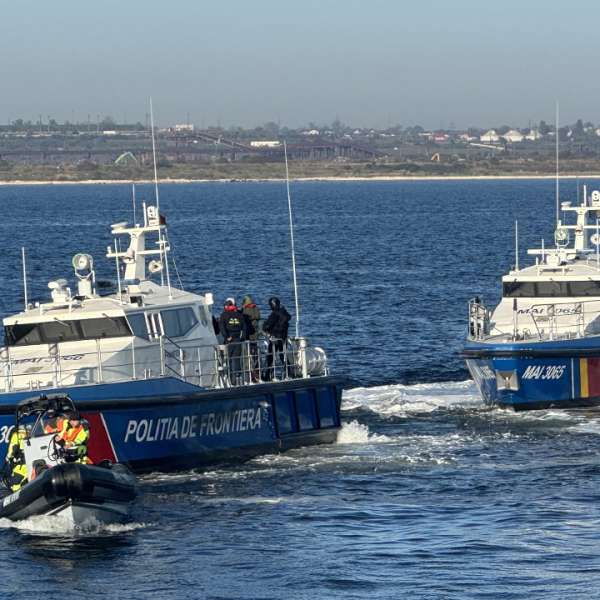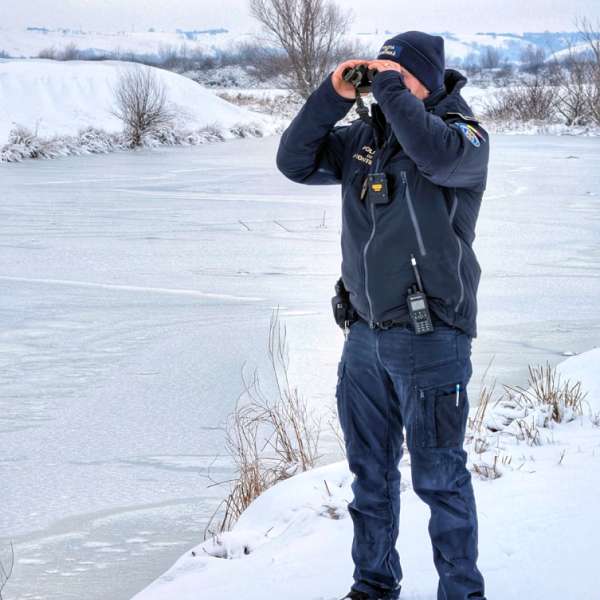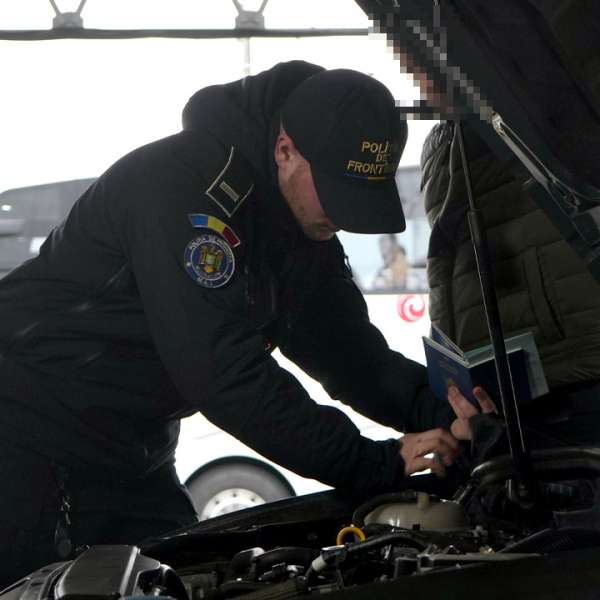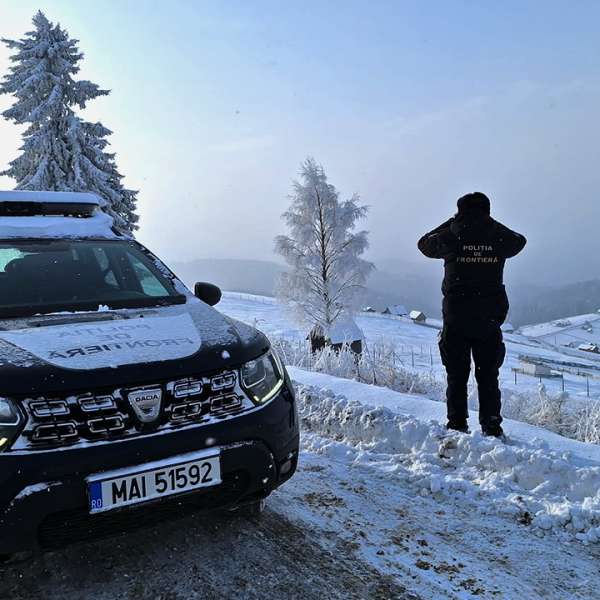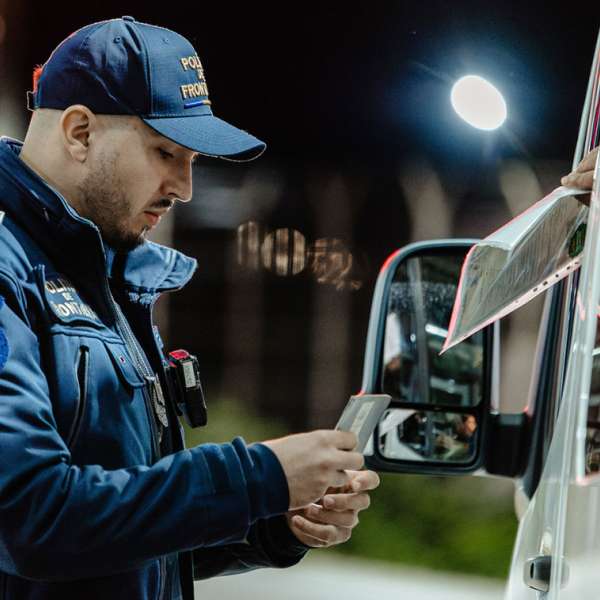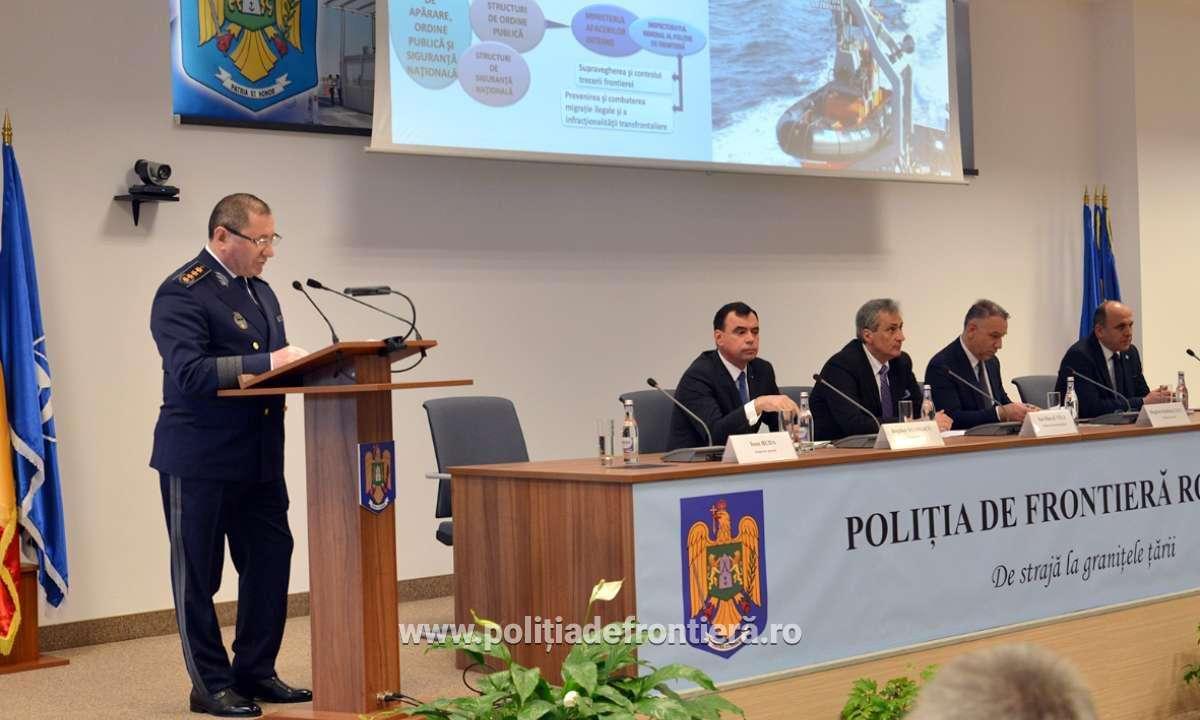
In 2019, the Romanian Border Police has pursued to fulfill the tasks given by the national law enforce, both as regards the optimization of border surveillance and control and the efficient countering of cross-border crime.
- OBJECTIVES:
In order to carry out the specific activities, the Romanian Border Police pursued to fulfill the following objectives:
- Management of the illegal migration and cross-border crime recorded in the competence territorial area of the border police, through a unitary implementation of the specific measures of prevention and countering, coordination – within the limits and conditions established by law – of the activities carried out by the subordinated structures and effective development of prevention and investigation activities of crimes related to illegal migration and cross-border crime.
- Permanent monitoring, coordination and assessment of activities regarding the execution of border control, the implementation way of the Schengen acquis at the level of subordinated structures and monitoring the implementation of best European practices in the border control field.
- Ensuring a high representation level of the Romanian state, of the Ministry of Interior and RBP in the cooperation relations with the similar structures in the neighbouring countries, with the partner structures in the EU MS, with the European agencies, as well as with other institutions.
- Ensuring the necessary of human resources, technique and land and naval mobility means, other specific equipment in order to fulfill the specific missions by all the subordinated structures.
- PERFORMANCE INDICATORS
- Values of traffic recorded in the border crossing points were approximately 8 million person crossings (56.8 million EU citizens and 13 million non-EU citizens) and 17.8 million transportation means.
In comparison with the last year, the traffic values for the persons crossing the Romanian borders increased with 10.7%, but on border sections a significant increase was ascertained at the border with Bulgaria (38.7%).
- In 2019 19 384 illegal deeds were ascertained, out of which 8 231 crimes 11 153
Most of the detected crimes were related to attempt or illegal border crossing (1 847 deeds), followed by crimes related to false and use of false (1 379) and economic-financial crimes, including trafficking with goods (1 077 deeds).
Last year, most of the criminal deeds were detected at the border with Republic of Moldova, representing 23.5% of the number of crimes ascertained at the Romanian border. Also, at the same border, most of the legal sanctions were applied, 31.6% of the total number.
In 2019, 7 743 foreign citizens were refused to enter the country as a result of non-complying the legal conditions to enter the country, recording an increase of 4.8% in comparison with the last year. The main reasons for entry refusal measure were: did not hold the necessary documents in order to justify the conditions and purpose of the stay, respectively did not hold a valid visa or a valid stay permit.
At the same time, at the border control, 116 500 Schengen or national alerts were detected, respectively approximately 2 000 wanted persons (Romanian and foreign nationals) were handed over to the competent authorities.
- In the field of illegal migration, the border guards detected 3 727 foreign nationals in the competence area attempting to cross illegally the border, out of which 2 048 on the entry and 1 679 on the exit, most of them acted illegally at the border organized in groups of migrants, with the support of smugglers.
- 699 migrant groups and 256 facilitators, Romanian and foreign nationals were detected.
- 684 were detected acting illegally at the green border, 827 of the migrants attempted to cross illegally the border hidden in transportation means, and the other 216 persons were detected while they were attempting to cross the border illegally using other methods (false travel documents and visas, person substitution, eluding the border control etc.)
- 1 232 persons applied for asylum at the Border Police structures, being handed over to the representatives of the General Inspectorate for Immigration for taking the legal measures.
Also, during the analyzed period, the Border Police intervened in order to prevent illegal entry of more than 6 000 persons at the Romanian-Serbian border.
As regards the nationality of the persons detected while attempting to cross illegally the border, it is ascertained that most of the citizens originate from: Iraq, Afghanistan, Syria, Bangladesh, Algeria, Turkey, Iran, Somalia, Morocco and Vietnam.
In comparison with 2018, an increase of 24% the number of persons detected while attempting to cross illegally the border is ascertained.
In order to manage the migration phenomenon at the Romanian borders, the following measures were disposed:
- at the border with Serbia, in 2019, the action measures carried out with the structures within MAI to enhance the surveillance at the border and to relocate the personnel and the surveillance and patrol equipment (air surveillance missions were carried out with the support of General Inspectorate of Aviation) were maintained.
- also, at the border with Republic of Bulgaria, measures were taken to enhance the border surveillance and control, meaning the relocation of personnel and the equipment in the endowment of TIBP Giurgiu to strengthen the identified risk areas.
SIGNIFICANT CASES
On 26.09.2019, at the Giurgiu Border Crossing Point, a Romanian citizen presented to transport grapes from Greece to Romania, according to the documents accompanying the goods. When checking the means of transportation, the border guards detected a specially arranged compartment, on the side wall of the utility vehicle, in which twenty-four Iraqi citizens and two Syrian citizens, aged between 2 and 49, were hidden.
The persons concerned stated that two Bulgarian citizens got them on the vehicle, and for the entire route, their relatives were to pay, when they arrived in Romania, the amount of 5 000 EUR per person, to a man who organized the transport.
The border guards stopped the travel of the persons, and according to the Romanian - Bulgarian protocol they were taken over by the Bulgarian Border Police in order to continue the investigations and to take the legal measures.
On 26.11.2019, the border guards within BCP Nădlac I - Arad County - detected 48 citizens in Iraq, Iran, Syria, Afghanistan and India hidden in the trailer of a freight vehicle, whom the driver tried to illegally exit Romania.
During the checks, the border guards established that there were six minors, three women and 39 men, asylum seekers in our country.
The border guards carry out investigations for committing migrant smuggling for the driver and attempting to illegally cross the state border for the 48 foreign nationals.
- In the field of prevention and countering goods smuggling – 73 economic-financial crimes and 1 004 smugglings and customs fraud, the value of the confiscated goods is 3 million lei. Approximately 334 persons were detected while crossing or attempting to cross illegally the border, who carried goods subject to smuggling or illegal trafficking with goods. An increase of approximately 47.7% of the value of the detected/confiscated goods by the border police is ascertained.
- 6 million packets of cigarettes, with an approximate value of 51.7 million lei, over 3,299 kg tobacco, 629 kg water pipe tobacco were detained for seizure, and 11 groups organized for committing cigarette smuggling, involving 86 persons, were identified and dismantled.
SIGNIFICANT CASES
On 02.02.2019, the border guards together with the customs employees within Halmeu Border Crossing Point, Satu Mare County, discovered, concealed in order to elude the customs control, hundreds of master boxes with hidden cigarettes, by the “lid” method, in packages with wooden materials.
Following the inventory of cigarettes, it was ascertained that in the packages with wooden briquettes was hidden the total quantity of 414 500 packages of cigarettes, different brands, amounting 1 865 250 lei.
The entire quantity of cigarettes was confiscated by the border guards.
On 13.03.2019, the border guards within Petea Border Crossing Point, Satu Mare County, together with employees within Oradea Regional Anti-Fraud Directorate discovered five pallets containing several boxes containing bulk tobacco, for which the person could not present any source document.
Following the inventory of the tobacco, it resulted the quantity of 1 012 kilograms, amounting to 868 000 lei.
The tobacco was confiscated, the driver being investigated for committing the crime of holding by any person outside the fiscal warehouse or marketing excisable products subject to marking on the territory of Romania, without being marked or improperly marked or with false markings, over the limit of a kilogram of bulk tobacco, according to the Fiscal Code.
- Other confiscated goods:
- 9 502 liters of alcohol;
-12.5 kg of gold and silver jewels;
-173 kg of amber;
-335 000 EUR and 240 000 USD;
-1 977 objects and coins from the National Cultural Heritage.
SIGNIFICANT CASES
On 06.05.2019, in BCP "Avram Iancu" Cluj International Airport, on the route Cluj-Napoca - Munich - Beijing, was detected a male, Chinese citizen, who had in his hand luggage several objects (earrings, teaspoons, bracelets, rings, etc.) made of silver-colored metal, weighing 10,737 kg. Following the control carried out on hold luggage, the same types of objects were discovered. The customs employees have retained the respective goods for evaluation in order to determine whether they belong to the National Cultural Heritage or to the precious metals category.
In this case, the border guards carried out investigations for committing illegal export activities, a fact provided for by Article 83 of Law no.782/2000.
- In the field of crimes with vehicles suspect of being stolen – during the analyzed period, in the competence area of the border police, 248 vehicles suspect of being stolen (200 vehicles, 25 buses, 2 motorcycles, 15 freight trucks and 6 trailers), 281 crimes were ascertained.
The persons involved in this illegal activity are Albanians, Bulgarians, Croatians, French, Georgians, Germans, Greeks and Romanians.
SIGNIFICANT CASES:
On 12.11.2019, at the Border Crossing Point Petea, Satu Mare County, a man with dual citizenship, Romanian-Moldovan, aged 23, domiciled on the radius of Argeș county, presented for entering the country.
He was driving a Porsche Cayenne vehicle, registered in Italy, produced in 2018. At the specific control, the border guards carried out further checks and they discovered that the aforementioned vehicle is being searched by the Italian authorities.
As a result, the vehicle, worth about 475 000 lei, was made unavailable at the headquarters of the Petea Border Police Sector.
On 09.07.2019, at the Giurgiu Border Crossing Point, a Romanian citizen who was driving a platform with a Tesla model X vehicle produced in 2016, presented to carry out border formalities.
Based on the risk analysis, the border guards carried out further checks and they discovered that the vehicle transported on the platform appears in the databases as being searched for confiscation, an alert introduced by the Norwegian authorities on 27.06.2019.
During this time, the border guards noticed, near the point, parked on the roadside, another Tesla vehicle, model S. Having suspicions about its presence in the area, the driver of the vehicle was legitimized and identified as a Romanian citizen, aged 39, who said that he was waiting for a platform to transport the vehicle to Bulgaria.
Once again, the border guards checked the respective vehicle in the databases and contacted the Norwegian authorities who informed us that the car belongs to a leasing company in Norway, thus issuing a good search alert for confiscation, on that day.
The Romanian citizens stated that they were transporting the two vehicles to Bulgaria, at the request of a friend and they were not aware of the fact that the vehicles were under the attention of the police.
In all the cases, the drivers were investigated for committing abetting and at the end of the investigations, the legal measures were taken.
- In the field of intellectual property right, 301 criminal deeds on the intellectual property right were ascertained. Thus, the border guards – independently or in collaboration with the customs employees detected counterfeit goods with marks of international protected trademarks, as follows:
-105 247 pieces of clothing and underwear;
-100.413 pieces of cosmetic and perfumery products;
-26.010 pairs of footwear;
-118.254 pieces of other products (electrical, toys, tools, scooters, pharmaceuticals, leather goods etc.).
SIGNIFICANT CASE:
On 10.08.2019, at 06.30, a Turkish citizen, aged 50, driving a truck registered in Romania, and transporting napkins from Turkey for a Romanian company, according to the documents accompanying the goods, presented at Giurgiu Border Crossing Point in order to enter the country.
Proceeding to check the means of transportation, the border guards noticed that the safety belt of the semi-trailer was severed and relapsed, and for this reason the cargo compartment was opened.
Following the thorough check, border guards discovered, behind a row of napkin boxes, dozens of bins containing 39 518 perfume bottles, which bore the marks of well-known brands that could be counterfeit.
During the investigations, the driver stated that he was hired by a national to transport the truck loaded with napkins in Romania and he was not aware that there were perfumes in the truck.
The entire quantity of perfumes, estimated at 2 469 875 EUR if it was marketed as a branded product, was handed over to the Customs Office Giurgiu, and the border guards started the investigations in terms of committing the crimes of “putting into circulation without a right a product bearing a mark identical or similar to the registered trademark for identical or similar products” fact provided for and punished by Article 90, paragraph 1, letter b of Law 84/1998, with the subsequent amendments and completions and "the use of non-real acts", a fact stipulated and punished by Article 272 of Law 86/2006.
- Other detections, recorded in 2019, were the following:
- 109 weapons, most of them nonlethal, 3 561 cartridges (for hunting, most of them), 105 360 pcs of pyrotechnic materials and 50 weapon components;
SIGNIFICANT CASE:
On 06.10.2019, at Giurgiu Border Crossing Point, a 32-year-old Serbian national driving a bus registered in Serbia, presented to enter the country.
On the occasion of the specific control, based on the risk analysis, the border guards discovered, inside the means of transportation, several white raffia sacks. Inside each sack there were several packages packed in tin foil, weighing, in total, approximately 750 kg and containing a dark green vegetable substance, supposed to be cannabis.
The entire amount of plant substance was seized by S.C.C.O. Giurgiu employees and sent for expertise to the Laboratory of Analysis and Profile of Drugs within the IGPR, where it reacted as cannabis.
In this case, the investigations were continued by the prosecutors of D.I.I.C.O.T. - Giurgiu Territorial Office together with S.C.C.O. Giurgiu, in the aspect of committing the crime of entering the country of risk drugs. If they were traded on the black market, the drugs would be worth about 9 000 000 EUR.
- In the field of countering and preventing fish poaching, 1 112 crimes related to fish poaching were ascertained, 1 324 civil sanctions amounting to 308 225 lei were applied and were confiscated: more than 28 000 meters and 2 316 pieces of monofilament nets, more than 439 other tools, 43 crafts, 32 boat engines, 40 kg caviar, 19.35 kg roe and 11 692 kg fish.
SIGNIFICANT CASE:
On 20.05.2019, the border guards within the Coast Guard identified in the Black Sea a Turkish fishing boat poaching in the Exclusive Economic Zone of Romania.
The crew of the fishing boat, consisting of 8 sailors, did not observe the legal orders of the border guards and tried to escape the pursuit of the RBP vessels, and for this reason the border guards gradually used their weapons, thus succeeding in stopping the Turkish fishing boat. The boat sank, the crew being transferred aboard one of the RBP vessels.
The commander of the boat was investigated under preventive custody, and the border guards within the Coast Guard, under the coordination of the prosecutor within the Prosecutor's Office of Constanta, conducted investigations for committing "commercial fishing in the natural fisheries habitats, by any means, of fish and other aquatic living creatures, during the prohibition period”, “illegal fishing and unreported fishing of the turbot”, “destruction or damage of a ship or its cargo"," managing the vessel by a person without a patent or without an appropriate capacity certificate"," commercial or sport fishing without a fishing license or authorization".
- INTERNATIONAL COOPERATION :
The collaboration activity of the RBP with the similar structures of the neighboring states was carried out in very good conditions, being carried out both working meetings at the level of the management of the institutions, as well as specific activities according to the agreements in force and the cooperation plans concluded, in the field of observing the legal regime of the state border and in the field of cooperation for countering cross-border crime. On these occasions, the problems registered at the common border, including the traffic flow at the borders were analyzed.
During the Romanian presidency of the Council of the European Union, the representatives of the Romanian Border Police made an important contribution within the working groups, according to the priorities and the calendar of the meetings (Border Working Group / Mixed Committee / False Documents, DAPIX - Exchange of information, Strategic Committee on Migration and Asylum (SCIFA);
The cooperation through the contact offices / centers / points at the border was carried out in good conditions, being transmitted / received to / from the cooperation partners 23 370 assistance requests (10 830 requests received and 12 540 requests transmitted) in the fields: illegal migration, forgeries in border crossing documents, stolen vehicles, customs fraud, identification of persons with a judicial record, etc.
In 2019, the Romanian Border Police participated in 12 joint operations and 4 operational projects organized under FRONTEX aegis, with 257 border guards (experts in various fields). Within Frontex operations, two OPVs, K9 units, patrol and service vehicles and themovision portable cameras were deployed.
The involvement of the Border Police in the activities of Frontex Agency consists of the participation with experts / technical equipment in the joint operations, the organization of joint operations on the territory of our country, the granting of operational assistance for limited periods of time, in the form of border intervention teams, the participation with means of naval mobility within the activities of prevention and countering illegal migration at the external maritime borders of the European Union, participation in the risk analysis at European level with the help of specialists from the specialized structure of the Romanian Border Police, as well as by training the border guards within specially organized sessions / courses.
In 2019, within the maritime operations carried out by the Agency, the Romanian border guards on the RBP vessels participated in missions in which they monitored the external maritime border in the Aegean Sea, they managed to rescue and transfer on board of vessels about 600 persons in danger at sea, on inflatable boats sailing or drifting at sea.
RBP was represented by 7 specialists within the Frontex Situational Center the National Coordination Center in Rome and the Local Coordination Center in Catania, as experts in the validation of incidents and the monitoring of suspicious vessels. During 2019, the last selection session of the RBP personnel took place, in order to expand the national expert pool - EBCGT, which currently consists of 518 RBP experts, specialized in various fields. Also, 208 Romanian border guards took part in the development activities of training programs, respectively specialized training sessions on the EBCGT profiles organized by the Agency at European level.
USE OF RESOURCES
- Personnel dynamics: - approximately 93% employees
- approximately 84% of the personnel carry out the activity in the operational field and 16% in the support structures.
Ensuring the human resources necessary at the level of the border police structures was one of the priority objectives of the institution, in the context where the RBP has the obligation to carry out the specific missions and to ensure a high level of surveillance and control of the entire border, in particular, of the external border of the EU.
Thus, in 2019, the necessary measures were taken to fill the remaining vacant positions, both with graduates of the educational units and by direct employment, from external source.
Thus, the enrollment figures at the own education units were approximately 600 graduates from the "Border Police" / other units offering the required specialization.
- Professional training: - 2 300 border guards participated in the courses organized by the education units of RBP, Ministry of Internal Affairs or other national specialized institutions, within 187 courses for career development;
- 272 border guards participated in training and specialization courses organized under FRONTEX, EUROPOL, CEPOL etc. aegis.
- Personnel motivation – 1 106 border guards were rewarded (with 14% more in comparison with 2018)
- 165 border guards were disciplinary sanctioned (3.7% more in comparison with 2018). 7 border guards agents were dismissed
Following the measures implemented along the lines of prevention and countering corruption acts, in 2019, at the level of the Romanian Border Police, 61 cases of resistance to corruption were registered (self-reporting), the territorial structures General Anticorruption Directorate being immediately notified.
- Material resources:
The technical component of the Integrated System for Border Security (ISBS) consists of its support subsystems, as follows: control, surveillance, fixed voice and data communications, professional mobile radio communications, information technology, infrastructure, mobility and integrated logistics support.
The logistical actions within each subsystem - support of the ISBS were realized from the financing sources carried out, mainly through the programs of the European non-reimbursable funds.
In 2019, the development and modernization of the RBP infrastructure remained a priority, being carried out actions for the drawing up and submission of the design documentation, the construction or modernization of several headquarters. Several investment objectives are being implemented, financed through the Internal Security Fund for the extension, modernization and rehabilitation of the headquarters.
Finalized projects:
- building the new headquarters of the Border Police Sector Isaccea –Coast Guard,
- thermo-energy rehabilitation of Border Police Sector Calafat, TIBP Giurgiu from the border with Bulgaria.
On-going projects:
- Modernization and extension - 2 HQ
- BPS Darabani, Botoșani county
- BPS Băneasa, Constanța county
- Building of headquarters:
- new headquarters of UNIP
- headquarters of Disaster Recovery
- headquarters of BPS Izvoarele Sucevei
- Thermo-energy rehabilitation of 4 headquarters:
- BCP Vama Veche
- TIBP Giurgiu
- BPTS Arad
- TIBP Oradea
- Rehabilitation, building, enhancement of headquarters through the cross-border cooperation programs RO-MD RO-UA
- BPS Tomeşti
- Enhancement of facilities S.F.I.C.P.P.F. Iaşi
- Warehouse for seized goods TIBP Sighetu Marmaţiei
- Administrative pavilion TIBP Sighetu Marmaţiei
As regards the land mobility system of the Romanian Border Police, it was developed by purchasing 65 patrol vehicles, for the field operational activities. Also, a project is on-going regarding the contracting vehicles with thermal-vision surveillance, in 2020, 26 vehicles will be delivered.
Regarding the equipment necessary to ensure the surveillance and control of the border, the degree of endowment was increased by the purchase of 80 portable cameras with thermo-vision without cooling, respectively 176 multifunctional mobile terminals that were configured and operationalized for the integration in the computer system of the RBP, these being distributed at the level territorial structures for their use in specific document control activities at border points.
Public procurement procedures have been carried out for the contracting of equipment for the control of travel documents, consisting of spectral video comparators, stationary UV lamps for document examination, compact portable equipment for document and visa examination and special devices for document control and verification.
In particular situations, it was taken into consideration the repair or contracting of the corrective maintenance activities for the existing equipment that no longer function under normal parameters: rooms with thermo-vision, tilting and rotating platforms, radars, surveillance vehicles with thermo-vision financed from the state budget and European funds.
Overall, the current level of equipment for mobile and fixed border surveillance equipment, as well as for land and naval mobility means, ensures the support of specific operational missions, the endowment being between 34 and 66%.
- Financial resources:
- Budgetary funds: - the budget execution was 99.96% and the aim was to observe the financial discipline, ensure the proper financing, both of the activities of border surveillance and control, as well as of the financial-logistical activities of the RBP structures, to ensure the financial balance between subordinate tertiary officers and the classification of expenses within the approved credits.
As regards the way of managing the financial resources, they were used both for granting the financial rights of the staff, as well as for the procurement of material goods necessary for the institution, the payment of utilities, fuels, etc.
During the control activities carried out by the representatives of the Court of Audit, no non-conformities or deviations from the legislation in force were registered.
- Non-reimbursable financial funds: The Romanian Border Police, through the specialized structures, managed projects financed from the INTERNAL SECURITY FUND, as well as projects financed from other types of European funds (programs, mechanisms, non-reimbursable financial instruments) for which the European Commission, other bodies and national and international authorities and institutions are financers.
Programs carried out from the internal security fund
The financing granted to the Border Police through the Internal Security Fund 108.69 mil. EUR.
For the Borders and Visas component in 2019, the allocation increased by 15%, compared to the value allocated until 2018, respectively from 88.6 million EUR to 103.44 million EUR. The additional funding allocated to the Romanian Border Police was intended for the purchase of surveillance and control equipment, the modernization of the surveillance system, but also for the development and implementation of the IT&C infrastructure.
Last year, 34 financing contracts were implemented and 3 contracts were signed, amounting to 3.44 million EUR, and 6 financing contracts, amounting to 12.49 million EUR, were signed.
The total value of the financing contracts signed until now represents 94.34% of the funding allocated through the Internal Security Fund.
The object of the contracts:
- Maintenance of surveillance, control and communications systems and equipment
- Purchase of intervention boats and patrol vessels
- Purchase of surveillance and control equipment
- Development and implementation of IT&C infrastructure for EES and ETIAS
- Development of the premises intended for conducting criminal investigation activities at the level of RBP
- Construction and rehabilitation of RBP headquarters
Projects funded by commission grants, research and development programs, structural funds and cross-border cooperation programs
The General Inspectorate of the Romanian Border Police participates in consortia, as beneficiary, partner or applicant, in various research and development projects, operational programs for cross-border cooperation and has signed contracts with the European Commission for two projects, amounting to 4.3 million EUR, within the Cooperation Programs Romania-Moldova, Romania-Ukraine.
Also, 5 grants totaling 400 000 EUR were finalized, out of which 2 R&D (implementation of a pre-operational version of the common information platform in the maritime field between EU Member States, development of an integrated system of land and maritime surveillance at the EU external borders with immediate operator alert) and 3 Frontex grants (development of training tools).
- PRIORITIES 2020
For 2020, the Romanian Border Police intends to implement measures aimed at the border field included in the programmatic documents, the national strategies, as well as the community normative acts;
- Ensuring and maintaining a high level of surveillance and control at the border and in the free movement area, including by introducing and using modern technologies, at the level of European standards, according to the operational needs;
- Ease of traffic through border points, following the observance of the provisions of the Schengen acquis, as well as the implementation of the recommendations of European experts;
- Implementation of large-scale projects at European level:
-Entry / Exit System
-ETIAS - European Travel Information and Authorization System
-EUROSUR - European Border Surveillance System
-SIS II - The second generation Schengen Information System
- ABC4EU - Automatic Gate Control System for Border Control
- Carrying out the activities necessary for the absorption at a maximum level of the non-reimbursable community funds meant to secure the external border of the European Union, by purchasing the technical means necessary to carry out the operational missions provided for in the programs financed by external reimbursable funds and budget;
- Maintaining and developing cooperation relations, both internally and internationally, with the authorities with responsibilities in border management and with similar structures in the other Member States of the European Union, neighboring and third countries;
- Ensuring the human, material and logistical resources necessary for the implementation of integrated border management;
- Construction of the new headquarters of the National Passenger Information Unit.
